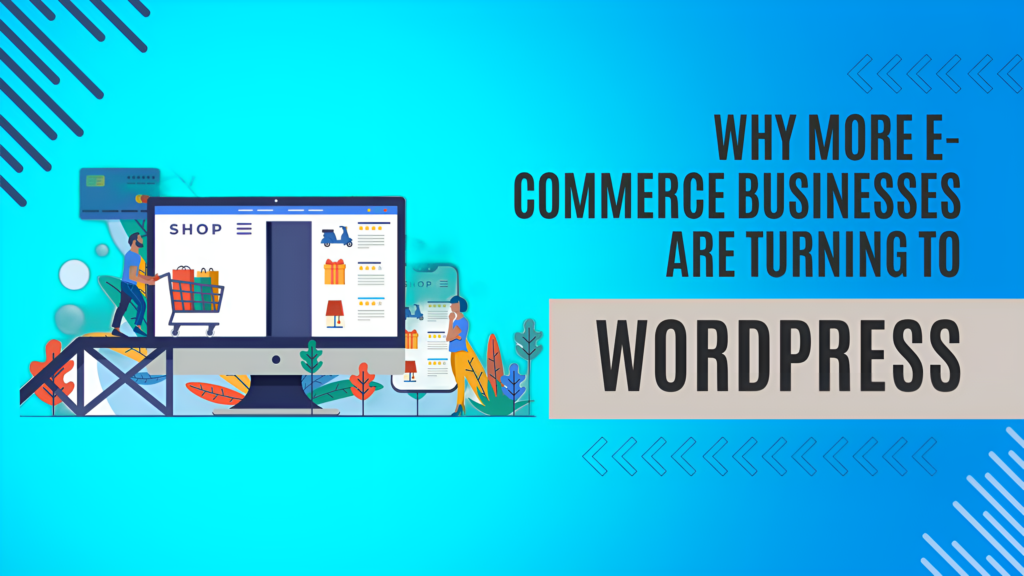Why More E-commerce Businesses Are Turning to WordPress

In the dynamic world of e-commerce, businesses are continually seeking robust, flexible, and cost-effective platforms to establish and grow their online presence. Among the myriad of choices available, WordPress has emerged as a preferred platform for many e-commerce businesses. But why is WordPress gaining such popularity? Let’s dive in and explore the reasons behind this trend.
What is WordPress?
Brief History of WordPress
WordPress started in 2003 as a simple blogging platform. Created by Matt Mullenweg and Mike Little, it has since evolved into a full-fledged content management system (CMS) that powers over 40% of all websites on the internet.
Evolution into E-commerce
While initially designed for blogging, WordPress has expanded its capabilities significantly. The introduction of plugins like WooCommerce transformed WordPress into a powerful e-commerce platform, allowing users to create and manage online stores with ease.
Why E-commerce Businesses Prefer WordPress
User-Friendly Interface
One of the biggest draws of WordPress is its user-friendly interface. Even those with minimal technical expertise can navigate through its dashboard, making it accessible for small business owners and entrepreneurs who may not have a background in web development.
Customization and Flexibility
WordPress offers unparalleled customization and flexibility. With thousands of themes and plugins available, businesses can tailor their websites to meet specific needs and preferences. Whether it’s adjusting the layout, adding new functionalities, or integrating with third-party services, WordPress makes it possible.
Cost-Effectiveness
Compared to other e-commerce platforms, WordPress is highly cost-effective. The core software is free, and while some themes and plugins come with a price tag, the overall cost of setting up and maintaining a WordPress site is often lower than proprietary e-commerce solutions.
SEO Benefits of WordPress
SEO-Friendly Features
WordPress is built with SEO in mind. It features clean code and semantic markup, which search engines love. This makes it easier for your website to rank higher in search results.
Plugins for Enhanced SEO
Plugins like Yoast SEO and All in One SEO Pack further enhance WordPress’s SEO capabilities. They offer features like XML sitemap generation, meta tag management, and keyword optimization, helping businesses improve their search engine visibility.
Improved Visibility and Traffic
With its SEO-friendly structure and plugins, WordPress can significantly boost a site’s visibility, driving more organic traffic. Higher visibility means more potential customers, which is crucial for any e-commerce business.
Scalability and Performance
Handling Growth
As your business grows, so does your website. WordPress is highly scalable, capable of handling an increasing number of products, customers, and transactions without compromising performance.
Performance Optimization Plugins
Performance is critical for e-commerce success. WordPress offers numerous plugins like WP Super Cache and W3 Total Cache that help optimize site speed and performance, ensuring a smooth shopping experience for users.
Security Features of WordPress
Built-in Security Measures
WordPress takes security seriously. It comes with built-in security features like password protection, role-based access control, and automatic updates that help protect your site from threats.
Plugins for Enhanced Security
For additional security, there are plugins like Wordfence and Sucuri Security that provide advanced features such as malware scanning, firewall protection, and login attempt monitoring.
Regular Updates and Patches
The WordPress community actively contributes to its security by regularly releasing updates and patches. Staying updated ensures your site is protected against the latest threats.
Integration Capabilities
Payment Gateways
WordPress seamlessly integrates with various payment gateways like PayPal, Stripe, and Square. This flexibility allows businesses to offer multiple payment options to their customers, enhancing the shopping experience.
Marketing Tools
Effective marketing is crucial for e-commerce success. WordPress integrates with numerous marketing tools such as Mailchimp, HubSpot, and Google Analytics, enabling businesses to manage their marketing efforts efficiently.
CRM Systems
Customer Relationship Management (CRM) systems are essential for managing customer interactions and data. WordPress can integrate with popular CRM systems like Salesforce and Zoho, helping businesses streamline their operations.

Mobile Responsiveness
Importance of Mobile in E-commerce
With the majority of online shopping now occurring on mobile devices, having a mobile-responsive website is essential. WordPress offers a wide range of mobile-optimized themes, ensuring your site looks great and functions well on all devices.
WordPress Themes for Mobile Optimization
Many WordPress themes are designed with mobile optimization in mind. These themes automatically adjust the layout and design to fit different screen sizes, providing a seamless experience for mobile users.
Community and Support
Extensive Support Network
WordPress boasts a large, active community of users and developers. This means you have access to extensive support resources, including forums, tutorials, and documentation.
Community Forums and Resources
The WordPress community is always ready to help. Whether you need advice on troubleshooting an issue or guidance on customization, you can find answers and support from fellow users and experts.

Case Studies of Successful E-commerce Sites Using WordPress
Small Business Success Stories
Many small businesses have thrived using WordPress for their e-commerce needs. For example, niche retailers and local artisans have leveraged WordPress to reach wider audiences and increase sales.
Large Enterprise Examples
Large enterprises have also turned to WordPress. Companies like TechCrunch and The Walt Disney Company use WordPress to manage their online presence, demonstrating its scalability and reliability.
Cost Comparison: WordPress vs. Other Platforms
Initial Setup Costs
Setting up a WordPress e-commerce site can be more affordable than using other platforms. While there are costs associated with premium themes, plugins, and hosting, the initial investment is typically lower than with proprietary systems.
Ongoing Maintenance Costs
WordPress sites can be maintained at a lower cost as well. Many updates and security measures can be implemented without the need for expensive developer contracts, reducing long-term expenses.
User Experience and Design
Customizable Themes
The wide array of customizable themes allows businesses to create unique, engaging websites. These themes are designed to enhance user experience, making it easier for customers to navigate and shop.
User-Friendly Design Features
WordPress themes often include user-friendly design features like drag-and-drop builders, which make it simple to create professional-looking pages without needing extensive coding knowledge.
Content Management
Ease of Managing Products
Managing products on a WordPress e-commerce site is straightforward. The platform offers intuitive tools for adding, editing, and organizing products, making inventory management a breeze.
Blogging and Content Marketing
WordPress’s roots in blogging make it an excellent choice for content marketing. Businesses can easily integrate a blog into their e-commerce site, creating content that drives traffic and engages customers.
Future Trends in WordPress E-commerce
Emerging Technologies
As technology evolves, so does WordPress. The platform continually integrates new technologies like AI, machine learning, and AR/VR, staying ahead of the curve and offering innovative solutions for e-commerce.
Predictions for Growth
The future looks bright for WordPress in e-commerce. With its ongoing development and strong community support, WordPress is poised to continue growing as a top choice for online businesses.
Conclusion
WordPress has proven to be a powerful, versatile platform for e-commerce businesses of all sizes. Its user-friendly interface, customization options, cost-effectiveness, and SEO benefits make it an ideal choice for those looking to build a successful online store.
FAQs
What makes WordPress a good choice for e-commerce?
WordPress is a good choice for e-commerce because it offers a user-friendly interface, extensive customization options, cost-effectiveness, and powerful SEO tools. Its ability to integrate with various plugins and third-party services further enhances its functionality.
How secure is a WordPress e-commerce site?
WordPress e-commerce sites are secure, especially when utilizing built-in security features and additional security plugins. Regular updates and patches help protect against vulnerabilities.
Can WordPress handle large-scale e-commerce businesses?
Yes, WordPress can handle large-scale e-commerce businesses. Its scalability allows it to manage a growing number of products, customers, and transactions without compromising performance.
What are the costs involved in setting up a WordPress e-commerce site?
The costs involved in setting up a WordPress e-commerce site include expenses for premium themes, plugins, and hosting. However, the overall cost is often lower than that of proprietary e-commerce solutions.
How does WordPress compare to other e-commerce platforms?
WordPress compares favorably to other e-commerce platforms due to its flexibility, cost-effectiveness, and extensive customization options. Its robust community support and wide range of plugins make it a versatile choice for businesses of all sizes.
Reach out to us on:
Abhay WordPress Developer
Our Website: https://abhay.wordpressdeveloperindia.com/
Email: abhaywordpressdeveloperindia@gmail.com
Mobile: +91 9084684934


